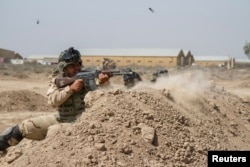The U.S. on Monday shut its Iraqi military headquarters controlling American ground operations against Islamic State, signifying the end of major combat operations against the insurgents.
Islamic State once controlled a third of Iraq and its second biggest city, Mosul. But Iraqi Prime Minister Haider al-Abadi last December declared that Iraqi forces, with the assistance of 5,000 U.S. troops in a support role, had defeated it.
The U.S. deactivated its Combined Joint Forces Land Component Command, "acknowledging the changing composition and responsibilities" of the coalition's fight against random Islamic State attacks.
The U.S., however, will continue to station troops in Iraq, although neither Washington nor Baghdad would say how many. They will continue to advise and equip missions in support of the Iraqi Security Force.
The American ground forces assisted in the three-year effort to claw back Islamic State territory in Iraq. Islamic State had taken over much of northern Iraq and northern Syria, where Raqqa, the capital of its self-proclaimed caliphate, has also been liberated even as the city's buildings have been left in shambles.
The U.S. troops were not involved in active combat in Iraq, but were often at field command centers near Mosul as they operated surveillance drones and advised Iraqi commanders on battlefield logistics.
The presence of the remaining U.S. troops in Iraq has become an issue in May's national elections in Iraq. Abadi has said he wants the U.S. troops to remain to continue to bolster Iraqi forces, but his opponents in the important Shiite militias, some of them aligned with Iran, have demanded that the American forces leave immediately.
National Security correspondent Jeff Seldin contributed to this report.





